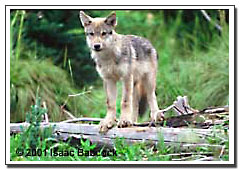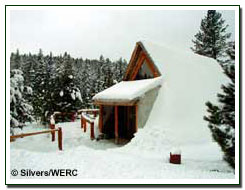
Economic stability important to Nez Perce
Redtail Singers: Songs can lift a person's heart
Tribal ethnographer passes on heritage
to younger generation
Memorandum tries to strengthen university
and tribal ties
Nez Perce horse culture
resurrected through new breed
|
LAPWAI
— The Nez Perce call him "He’me." Their past
connects with him both culturally and spiritually. He was a keen
hunter and, like the Nez Perce, kept a close family bond.
|
Lawrence said the Tribe estimates there are currently more than 260 wolves in Idaho. He considers this a success and said they will be de-listed in Idaho after only seven years into the recovery. The Tribe has been recognized nationally for its efforts, including an "Honoring Nations" award from the Harvard Project on American Indian Economic Development. The Nez Perce Tribe also works with the Wolf Education and Research Center. Founded in 1990, the WERC was originally based in Stanley, Idaho, and moved in 1996 to Nez Perce Tribal land near Winchester, Idaho. It was there that the WERC opened a visitor’s center in 1997 on land that the tribe owns. It is home to 11 wolves that starred in an Emmy award-winning documentary, "Wolf: Return of a Legend." They were born in captivity and socialized with humans. They cannot live in the wild.
The center tries to educate the public about wolf recovery. "Information and education needs to be done to de-mystify the wolf," Lawrence said. However, there are many people who think relocation is a bad idea. Some worry about larger populations attacking livestock. One pack, the Whitehawk, was recently killed after attacking a multitude of livestock, including a 4-H project. Recently, the Turner Endangered Species Fund, U.S. Fish and Wildlife Service, Defenders of Wildlife, USDA Wildlife Services and the University of Montana initiated a cooperative effort to condition wolves to stop killing cattle. This hasn’t appeased most livestock owners and lethal control has been the answer to most livestock depredation. Recently, Carter Niemeyer, the U.S. Fish and Wildlife Service wolf recovery coordinator for Idaho, came under fire for shooting a pack that had been killing for more than a year. He said he has received many e-mails calling him a heartless killer. Many environmental groups oppose killing the wolf. Big-game hunters are not necessarily fans of the wolf either. Brian Dunlap, owner of Land Owner’s Cooperative Hunting Club, said he has seen the amount of elk and deer in the Clearwater region diminish yearly since the wolf has been reintroduced. In February, during the 2002 Idaho Legislature, hunters and ranchers encouraged the state to sue the federal government and have the wolves removed. They argued that it was unconstitutional for Congress to take charge of a state issue. Instead of taking such drastic measures, the Idaho Conservation League, U.S. Sen. Larry Craig, the WERC and various other livestock and outfitter groups drafted a plan to outline how the state will manage wolves, once they are de-listed. The plan will allow ranchers to kill wolves that bother livestock and will open a hunting season five years after de-listing the wolves. Dunlap said that most hunters aren’t excited about wolf hunting season. "I think their theory is sound," he said, "but letting us hunt them isn’t going to have any effect." The tribe will not take part in hunting wolves. Holt said the tribe will continue to honor their "ancient relationships and understanding with all species." "Restoring the wolf to its rightful place provides an opportunity for the Tribe to rekindle its cultural ties to the wolf," said Pinkham. The tribe will continue to exercise its treaty rights and maintain the population. "What affects them, affects us," said Holt. |
|||||||||
|
||||||||||


